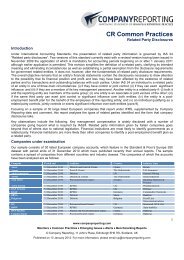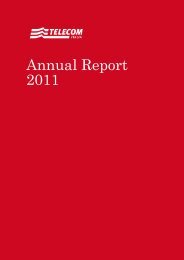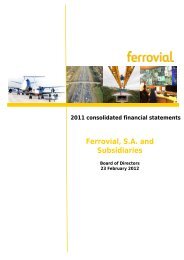Additional information for shareholdersMarket prices for the ordinary shares on the LSE <strong>and</strong> in after-hours tradingoff the LSE, in each case while the NYSE is open, <strong>and</strong> the market prices forADSs on the NYSE, are closely related due to arbitrage among the variousmarkets, although differences may exist from time to time due to variousfactors, including UK stamp duty reserve tax.On 17 February <strong>20</strong>12, 838,650,908 ADSs (equivalent toapproximately 5,031,905,448 ordinary shares or some 26.51% of the totalissued share capital, excluding shares held in treasury) were outst<strong>and</strong>ing<strong>and</strong> were held by approximately 109,640 ADS holders. Of these, about108,369 had registered addresses in the US at that date. One of theregistered holders of ADSs represents some 811,108 underlying holders.On 17 February <strong>20</strong>12, there were approximately 303,0<strong>20</strong> holdersof record of ordinary shares. Of these holders, around 1,585 had registeredaddresses in the US <strong>and</strong> held a total of some 4,331,996 ordinary shares.Since certain of the ordinary shares <strong>and</strong> ADSs were held by brokers<strong>and</strong> other nominees, the number of holders of record in the US may notbe representative of the number of beneficial holders or of their country ofresidence.Material contractsOn 6 August <strong>20</strong>10, <strong>BP</strong> entered into a trust agreement with John S Martin,Jr <strong>and</strong> Kent D Syverud, as individual trustees, <strong>and</strong> Citigroup Trust-Delaware,N.A., as corporate trustee (the Trust Agreement) which established theDeepwater Horizon Oil Spill Trust (the Trust) to be funded in the amount of$<strong>20</strong> billion (the trust fund) over the period to the fourth quarter of <strong>20</strong>13. Thetrust fund is available to satisfy legitimate individual <strong>and</strong> business claimsadministered by the Gulf Coast Claims Facility (GCCF), state <strong>and</strong> localgovernment claims resolved by <strong>BP</strong>, final judgments <strong>and</strong> settlements, state<strong>and</strong> local response costs, <strong>and</strong> natural resource damages <strong>and</strong> related costs.Fines, penalties <strong>and</strong> claims administration costs are not covered by the trustfund. Under the terms of the Trust Agreement, <strong>BP</strong> has no right to accessthe funds once they have been contributed to the trust fund. <strong>BP</strong> will receivefunds from the trust fund only upon its expiration, if there are any fundsremaining at that point. <strong>BP</strong> has the authority under the Trust Agreement topresent certain resolved claims, including natural resource damages claims<strong>and</strong> state <strong>and</strong> local response claims, to the Trust for payment, by providingthe trustees with all the required documents establishing that such claimsare valid under the Trust Agreement. However, any such payments canonly be made on the authority of the trustee <strong>and</strong> any funds distributed arepaid directly to the claimants, not to <strong>BP</strong>. The Trust Agreement is governedby the laws of the State of Delaware.On 30 September <strong>20</strong>10, <strong>BP</strong> entered a pledge <strong>and</strong> collateralagreement in favour of John S Martin, Jr <strong>and</strong> Kent D Syverud (the PledgeAgreement), which pledged certain Gulf of Mexico assets as collateralfor the trust fund funding obligation. The pledged collateral consists of anoverriding royalty interest in oil <strong>and</strong> gas production of <strong>BP</strong>’s Thunder Horse,Atlantis, Mad Dog, Great White <strong>and</strong> Mars, Ursa <strong>and</strong> Na Kika assets in theGulf of Mexico. A wholly-owned company called Verano Collateral HoldingsLLC (Verano) has been created to hold the overriding royalty interest, whichwas capped at $1.25 billion per quarter <strong>and</strong> $17 billion in total. Veranopledged the overriding royalty interest to the Trust as collateral for <strong>BP</strong>’sremaining contribution obligations to the Trust. An event of default underthe Pledge Agreement arose if <strong>BP</strong> failed to make any contribution underthe Trust Agreement when due or otherwise failed to observe certain otherobligations, subject to specified cure periods. Following an event of default,the trustees were entitled to exercise all remedies as secured parties inrespect of the collateral, including receipt of royalty interests from thepledged assets, having all or part of the limited liability company interestsregistered in the trustees’ name <strong>and</strong> selling the collateral at public orprivate sale. The Pledge Agreement was governed by the laws of the Stateof Texas. On 9 November <strong>20</strong>11 the Pledge Agreement <strong>and</strong> the relatedoverriding royalty interest conveyance <strong>and</strong> mortgage were amended <strong>and</strong>restated (such documents collectively referred to as the Amended <strong>and</strong>Restated Pledge Agreement) to change the overriding royalty interesteffective as of 1 October <strong>20</strong>11 to $14.7 billion. Beginning on 2 January<strong>20</strong>12, <strong>and</strong> on the first business day of each subsequent calendar quarter,the overriding royalty interest is recalculated as the remaining outst<strong>and</strong>ingcontributions owed by <strong>BP</strong> to the Trust as of that date multiplied by a factorof 1.45. On 2 January <strong>20</strong>12 the overriding royalty interest was recalculatedas $7.1 billion. The Amended <strong>and</strong> Restated Pledge Agreement alsochanged the definition of an event of default to be a failure by <strong>BP</strong> to makerequired payments pursuant to the terms of the Trust Agreement.Exchange controlsThere are currently no UK foreign exchange controls or restrictions onremittances of dividends on the ordinary shares or on the conduct of thecompany’s operations.There are no limitations, either under the laws of the UK or underthe company’s Articles of Association, restricting the right of non-residentor foreign owners to hold or vote <strong>BP</strong> ordinary or preference shares in thecompany.TaxationThis section describes the material US federal income tax <strong>and</strong> UK taxationconsequences of owning ordinary shares or ADSs to a US holder whoholds the ordinary shares or ADSs as capital assets for tax purposes.It does not apply, however, to members of special classes of holderssubject to special rules <strong>and</strong> holders that, directly or indirectly, hold 10%or more of the company’s voting stock. In addition, if a partnership holdsthe shares or ADSs, the US federal income tax treatment of a partner willgenerally depend on the status of the partner <strong>and</strong> the tax treatment of thepartnership <strong>and</strong> may not be described fully below.A US holder is any beneficial owner of ordinary shares or ADSs thatis for US federal income tax purposes (i) a citizen or resident of the US, (ii)a US domestic corporation, (iii) an estate whose income is subject to USfederal income taxation regardless of its source, or (iv) a trust if a US courtcan exercise primary supervision over the trust’s administration <strong>and</strong> one ormore US persons are authorized to control all substantial decisions of thetrust.This section is based on the Internal Revenue Code of 1986,as amended, its legislative history, existing <strong>and</strong> proposed regulationsthereunder, published rulings <strong>and</strong> court decisions, <strong>and</strong> the taxation lawsof the UK, all as currently in effect, as well as the income tax conventionbetween the US <strong>and</strong> the UK that entered into force on 31 March <strong>20</strong>03(the ‘Treaty’). These laws are subject to change, possibly on a retroactivebasis. This section is further based in part on the representations of theDepositary <strong>and</strong> assumes that each obligation in the Deposit Agreement<strong>and</strong> any related agreement will be performed in accordance with its terms.For purposes of the Treaty <strong>and</strong> the estate <strong>and</strong> gift tax Convention(the ‘Estate Tax Convention’,) <strong>and</strong> for US federal income tax <strong>and</strong> UKtaxation purposes, a holder of ADRs evidencing ADSs will be treated asthe owner of the company’s ordinary shares represented by those ADRs.Exchanges of ordinary shares for ADRs <strong>and</strong> ADRs for ordinary sharesgenerally will not be subject to US federal income tax or to UK taxationother than stamp duty or stamp duty reserve tax, as described below.Investors should consult their own tax adviser regarding the USfederal, state <strong>and</strong> local, UK <strong>and</strong> other tax consequences of owning <strong>and</strong>disposing of ordinary shares <strong>and</strong> ADSs in their particular circumstances,<strong>and</strong> in particular whether they are eligible for the benefits of the Treaty.Taxation of dividendsUK taxationUnder current UK taxation law, no withholding tax will be deducted fromdividends paid by the company, including dividends paid to US holders.A shareholder that is a company resident for tax purposes in the UKor trading in the UK through a permanent establishment generally willnot be taxable in the UK on a dividend it receives from the company. Ashareholder who is an individual resident for tax purposes in the UK issubject to UK tax but entitled to a tax credit on cash dividends paid onordinary shares or ADSs of the company equal to one-ninth of thecash dividend.168 <strong>BP</strong> <strong>Annual</strong> <strong>Report</strong> <strong>and</strong> <strong>Form</strong> <strong>20</strong>-F <strong>20</strong>11
Additional information for shareholdersUS federal income taxationA US holder is subject to US federal income taxation on the gross amountof any dividend paid by the company out of its current or accumulatedearnings <strong>and</strong> profits (as determined for US federal income tax purposes).Dividends paid to a non-corporate US holder in taxable years beginningbefore 1 January <strong>20</strong>13 that constitute qualified dividend income will betaxable to the holder at a maximum tax rate of 15%, provided that theholder has a holding period in the ordinary shares or ADSs of more than60 days during the 121-day period beginning 60 days before the exdividenddate <strong>and</strong> meets other holding period requirements. Dividendspaid by the company with respect to the shares or ADSs will generally bequalified dividend income.As noted above in UK taxation, a US holder will not be subject toUK withholding tax. A US holder will include in gross income for US federalincome tax purposes the amount of the dividend actually received from thecompany, <strong>and</strong> the receipt of a dividend will not entitle the US holder to aforeign tax credit.For US federal income tax purposes, a dividend must be includedin income when the US holder, in the case of ordinary shares, or theDepositary, in the case of ADSs, actually or constructively receives thedividend <strong>and</strong> will not be eligible for the dividends-received deductiongenerally allowed to US corporations in respect of dividends received fromother US corporations. Dividends will be income from sources outside theUS <strong>and</strong> generally will be ‘passive category income’ or, in the case of certainUS holders, ‘general category income’, each of which is treated separatelyfor purposes of computing a US holder’s foreign tax credit limitation.The amount of the dividend distribution on the ordinary sharesor ADSs that is paid in pounds sterling will be the US dollar value of thepounds sterling payments made, determined at the spot pounds sterling/US dollar rate on the date the dividend distribution is includible in income,regardless of whether the payment is, in fact, converted into US dollars.Generally, any gain or loss resulting from currency exchange fluctuationsduring the period from the date the pounds sterling dividend payment isincludible in income to the date the payment is converted into US dollarswill be treated as ordinary income or loss <strong>and</strong> will not be eligible for the15% tax rate on qualified dividend income. The gain or loss generallywill be income or loss from sources within the US for foreign tax creditlimitation purposes.Distributions in excess of the company’s earnings <strong>and</strong> profits, asdetermined for US federal income tax purposes, will be treated as a returnof capital to the extent of the US holder’s basis in the ordinary shares orADSs <strong>and</strong> thereafter as capital gain, subject to taxation as described inTaxation of capital gains – US federal income taxation section below.In addition, the taxation of dividends may be subject to the rulesfor passive foreign investment companies (PFIC), described below under‘Taxation of capital gains – US federal income taxation’. Distributions madeby a PFIC do not constitute qualified dividend income <strong>and</strong> are not eligiblefor the 15% tax rate.Taxation of capital gainsUK taxationA US holder may be liable for both UK <strong>and</strong> US tax in respect of a gainon the disposal of ordinary shares or ADSs if the US holder is (i) a citizenof the US resident or ordinarily resident in the UK, (ii) a US domesticcorporation resident in the UK by reason of its business being managed orcontrolled in the UK or (iii) a citizen of the US or a corporation that carrieson a trade or profession or vocation in the UK through a branch or agencyor, in respect of corporations for accounting periods beginning on orafter 1 January <strong>20</strong>03, through a permanent establishment, <strong>and</strong> that haveused, held, or acquired the ordinary shares or ADSs for the purposes ofsuch trade, profession or vocation of such branch, agency or permanentestablishment. However, such persons may be entitled to a tax creditagainst their US federal income tax liability for the amount of UK capitalgains tax or UK corporation tax on chargeable gains (as the case may be)that is paid in respect of such gain.Under the Treaty, capital gains on dispositions of ordinary shares or ADSsgenerally will be subject to tax only in the jurisdiction of residence of therelevant holder as determined under both the laws of the UK <strong>and</strong> the US<strong>and</strong> as required by the terms of the Treaty.Under the Treaty, individuals who are residents of either the UK orthe US <strong>and</strong> who have been residents of the other jurisdiction (the US orthe UK, as the case may be) at any time during the six years immediatelypreceding the relevant disposal of ordinary shares or ADSs may be subjectto tax with respect to capital gains arising from a disposition of ordinaryshares or ADSs of the company not only in the jurisdiction of whichthe holder is resident at the time of the disposition but also in the otherjurisdiction.US federal income taxationA US holder who sells or otherwise disposes of ordinary shares or ADSswill recognize a capital gain or loss for US federal income tax purposesequal to the difference between the US dollar value of the amount realized<strong>and</strong> the holder’s tax basis, determined in US dollars, in the ordinary sharesor ADSs. Any capital gain of a non-corporate US holder is generally taxed atpreferential rates if the holder’s holding period for such ordinary shares orADSs exceeds one year. The gain or loss will generally be income or lossfrom sources within the US for foreign tax credit limitation purposes. Thedeductibility of capital losses is subject to limitations.We do not believe that ordinary shares or ADSs will be treated asstock of a passive foreign investment company, or PFIC, for US federalincome tax purposes, but this conclusion is a factual determination thatis made annually <strong>and</strong> thus is subject to change. If we are treated as aPFIC, unless a US holder elects to be taxed annually on a mark-to-marketbasis with respect to ordinary shares or ADSs, any gain realized on thesale or other disposition of ordinary shares or ADSs would in general notbe treated as capital gain. Instead, a US holder would be treated as if heor she had realized such gain rateably over the holding period for ordinaryshares or ADSs <strong>and</strong> would be taxed at the highest tax rate in effect foreach such year to which the gain was allocated, in addition to which aninterest charge in respect of the tax attributable to each such year wouldapply. Certain ‘excess distributions’ would be similarly treated if we weretreated as a PFIC.Additional tax considerationsScrip Dividend ProgrammeThe company has introduced an optional Scrip Dividend Programme,wherein holders of ordinary shares or ADSs may elect to receive anydividends in the form of new, fully-paid ordinary shares or ADSs ofthe company, instead of cash. Please consult your tax adviser for theconsequences to you.UK inheritance taxThe Estate Tax Convention applies to inheritance tax. ADSs held by anindividual who is domiciled for the purposes of the Estate Tax Conventionin the US <strong>and</strong> is not for the purposes of the Estate Tax Conventiona national of the UK will not be subject to UK inheritance tax on theindividual’s death or on transfer during the individual’s lifetime unless,among other things, the ADSs are part of the business property of apermanent establishment situated in the UK used for the performance ofindependent personal services. In the exceptional case where ADSs aresubject to both inheritance tax <strong>and</strong> US federal gift or estate tax, the EstateTax Convention generally provides for tax payable in the US to be creditedagainst tax payable in the UK or for tax paid in the UK to be credited againsttax payable in the US, based on priority rules set forth in the Estate TaxConvention.Additional information for shareholders<strong>BP</strong> <strong>Annual</strong> <strong>Report</strong> <strong>and</strong> <strong>Form</strong> <strong>20</strong>-F <strong>20</strong>11 169
- Page 2 and 3:
Cover imagePhotograph of DeepseaSta
- Page 4 and 5:
Cross reference to Form 20-FPageIte
- Page 6 and 7:
Miscellaneous termsIn this document
- Page 8 and 9:
6 BP Annual Report and Form 20-F 20
- Page 10:
Chairman’s letterCarl-Henric Svan
- Page 13 and 14:
During the year, the remuneration c
- Page 15 and 16:
Business review: Group overviewBP A
- Page 17 and 18:
SafetyDuring the year, we reorganiz
- Page 19 and 20:
In Refining and Marketing, our worl
- Page 21 and 22:
Crude oil and gas prices,and refini
- Page 23:
In detailFor more information, seeR
- Page 26 and 27:
Our market: Longer-term outlookThe
- Page 29 and 30:
BP’s distinctive capabilities and
- Page 31 and 32:
Technology will continue to play a
- Page 33 and 34:
In detailFor more information,see C
- Page 35 and 36:
In detailFind out more online.bp.co
- Page 37 and 38:
BP Annual Report and Form 20-F 2011
- Page 39 and 40:
Below BP has asignificant presencei
- Page 41 and 42:
What you can measure6 Active portfo
- Page 43 and 44:
Business review: Group overview2012
- Page 45 and 46:
Our risk management systemOur enhan
- Page 47 and 48:
Our current strategic priorities ar
- Page 49 and 50:
Our performance2011 was a year of f
- Page 51 and 52:
Left BP employeesat work in Prudhoe
- Page 53 and 54:
We continued to sell non-core asset
- Page 55 and 56:
Reported recordableinjury frequency
- Page 57 and 58:
Business reviewBP in more depth56 F
- Page 59 and 60:
Business reviewThe primary addition
- Page 61 and 62:
Business reviewRisk factorsWe urge
- Page 63 and 64:
Business review2010. Similar action
- Page 65 and 66:
Business reviewBusiness continuity
- Page 67:
Business reviewSafetyOver the past
- Page 70:
Business reviewour review of all th
- Page 73 and 74:
Business reviewGreenhouse gas regul
- Page 75 and 76:
Business reviewresources such as dr
- Page 77 and 78:
Business reviewExploration and Prod
- Page 79 and 80:
Business reviewCompleting the respo
- Page 81 and 82:
Business reviewgrants, which were s
- Page 83 and 84:
Business reviewOur performanceKey s
- Page 85 and 86:
Business reviewwere in Russia (Oren
- Page 87 and 88:
Business reviewCanadaIn Canada, BP
- Page 89 and 90:
Business review• In March 2011, T
- Page 91 and 92:
Business reviewaccess advantageous
- Page 93 and 94:
Business reviewBP’s vice presiden
- Page 95 and 96:
Business reviewhttp://www.bp.com/do
- Page 97 and 98:
Business reviewbalance of participa
- Page 99 and 100:
Business reviewAcquisitions and dis
- Page 101 and 102:
Business reviewLPGOur global LPG ma
- Page 103 and 104:
Business reviewOther businesses and
- Page 105 and 106:
Business reviewLiquidity and capita
- Page 107 and 108:
Business reviewThe group expects it
- Page 109 and 110:
Business reviewFrequently, work (in
- Page 111 and 112:
Business reviewHazardous and Noxiou
- Page 113 and 114:
Business reviewpart of a larger por
- Page 115 and 116:
Directors andsenior management114 D
- Page 117 and 118:
Directors and senior managementDire
- Page 119 and 120: Directors and senior managementH L
- Page 121 and 122: Corporate governanceCorporate gover
- Page 123 and 124: Corporate governanceAntony Burgmans
- Page 125 and 126: Corporate governanceBoard oversight
- Page 127 and 128: Corporate governanceBoard and commi
- Page 129 and 130: Corporate governancefinancial repor
- Page 131 and 132: Corporate governancechairs and secr
- Page 133 and 134: Corporate governance• Oversee GCR
- Page 135 and 136: Corporate governanceCommittee’s r
- Page 137 and 138: Corporate governanceControls and pr
- Page 139 and 140: Corporate governanceThe Act require
- Page 141 and 142: Directors’ remuneration reportRem
- Page 143 and 144: Directors’ remuneration reportSum
- Page 145 and 146: Directors’ remuneration reportSaf
- Page 147 and 148: Directors’ remuneration reportRem
- Page 149 and 150: Directors’ remuneration reportThe
- Page 151 and 152: Directors’ remuneration reportSha
- Page 153 and 154: Directors’ remuneration reportNon
- Page 155 and 156: Additional informationfor sharehold
- Page 157 and 158: Additional information for sharehol
- Page 159 and 160: Additional information for sharehol
- Page 161 and 162: Additional information for sharehol
- Page 163 and 164: Additional information for sharehol
- Page 165 and 166: Additional information for sharehol
- Page 167 and 168: Additional information for sharehol
- Page 169: Additional information for sharehol
- Page 173 and 174: Additional information for sharehol
- Page 175 and 176: Financial statements174 Statement o
- Page 177 and 178: Consolidated financial statements o
- Page 179 and 180: Consolidated financial statements o
- Page 181 and 182: Consolidated financial statements o
- Page 183 and 184: Consolidated financial statements o
- Page 185 and 186: Notes on financial statements1. Sig
- Page 187 and 188: Notes on financial statements1. Sig
- Page 189 and 190: Notes on financial statements1. Sig
- Page 191 and 192: Notes on financial statements1. Sig
- Page 193 and 194: Notes on financial statementshttp:/
- Page 195 and 196: Notes on financial statementshttp:/
- Page 197 and 198: Notes on financial statements3. Bus
- Page 199 and 200: Notes on financial statements5. Dis
- Page 201 and 202: Notes on financial statements5. Dis
- Page 203 and 204: Notes on financial statementshttp:/
- Page 205 and 206: Notes on financial statementshttp:/
- Page 207 and 208: Notes on financial statements7. Int
- Page 209 and 210: Notes on financial statements10. Im
- Page 211 and 212: Notes on financial statements15. Ex
- Page 213 and 214: Notes on financial statementshttp:/
- Page 215 and 216: Notes on financial statementshttp:/
- Page 217 and 218: Notes on financial statementshttp:/
- Page 219 and 220: Notes on financial statements26. Fi
- Page 221 and 222:
Notes on financial statements26. Fi
- Page 223 and 224:
Notes on financial statements26. Fi
- Page 225 and 226:
Notes on financial statements29. Tr
- Page 227 and 228:
Notes on financial statements33. De
- Page 229 and 230:
Notes on financial statements33. De
- Page 231 and 232:
Notes on financial statements34. Fi
- Page 233 and 234:
Notes on financial statementshttp:/
- Page 235 and 236:
Notes on financial statements36. Pr
- Page 237 and 238:
Notes on financial statements37. Pe
- Page 239 and 240:
Notes on financial statements37. Pe
- Page 241 and 242:
Notes on financial statements37. Pe
- Page 243 and 244:
Notes on financial statements38. Ca
- Page 245 and 246:
Notes on financial statementsTotal
- Page 247 and 248:
Notes on financial statements39. Ca
- Page 249 and 250:
Notes on financial statements40. Sh
- Page 251 and 252:
Notes on financial statements42. Re
- Page 253 and 254:
Notes on financial statements45. Su
- Page 255 and 256:
Notes on financial statements46. Co
- Page 257 and 258:
Notes on financial statements46. Co
- Page 259:
Notes on financial statements46. Co
- Page 262 and 263:
Supplementary information on oil an
- Page 264 and 265:
Supplementary information on oil an
- Page 266 and 267:
Supplementary information on oil an
- Page 268 and 269:
Supplementary information on oil an
- Page 270 and 271:
Supplementary information on oil an
- Page 272 and 273:
Supplementary information on oil an
- Page 274 and 275:
Supplementary information on oil an
- Page 276 and 277:
Supplementary information on oil an
- Page 278 and 279:
Supplementary information on oil an
- Page 280 and 281:
Supplementary information on oil an
- Page 282 and 283:
Supplementary information on oil an
- Page 284 and 285:
SignaturesThe registrant hereby cer
- Page 286 and 287:
Parent company financial statements
- Page 288 and 289:
Parent company financial statements
- Page 290 and 291:
Parent company financial statements
- Page 292 and 293:
Parent company financial statements
- Page 294 and 295:
Parent company financial statements
- Page 296 and 297:
Parent company financial statements
- Page 298 and 299:
Parent company financial statements










